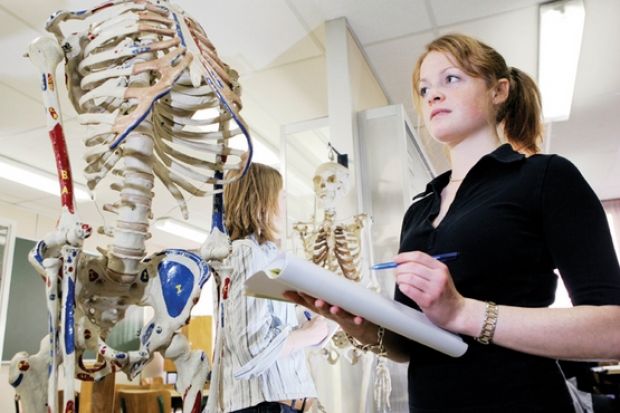The funding system for nursing, midwifery and allied health professional degrees “is no longer working” and needs to change, universities have said.
A joint statement issued by the Council of Deans of Health and Universities UK says that the existing system of National Health Service grants has left universities short-changed, as funding for nursing and physiotherapy courses is now the lowest of any subject in higher education.
It has also caused a shortage of graduates in nursing and a failure to grow the number of physiotherapists despite high demand for places on such courses.
NHS grants tie universities to control student numbers and can cause graduate shortages if requirement predictions are incorrect, because of the time-lag involved in training.
Typically, these courses are longer than traditional degrees so that students have less to live on over the course of an academic year, which can lead to financial hardship, say CDH and Universities UK in the statement published on 29 June. In 2012-13, almost two-thirds of the access to learning fund at King's College London went to NHS funded students, for example.
The CDH and Universities UK call for the government to “consider urgently” whether funding can be switched from grants to loans.
“The current funding system is also no longer working for either students or universities…we need a more flexible system that will cushion the health service from changes that it cannot anticipate,” says the statement.
“Funding for nursing and physiotherapy degrees is also now lower than any other subject in higher education, even though these courses put much higher demands on universities in areas such as quality assurance, laboratory space and simulation kit,” it adds.
It also calls on the government to explore new ways of attracting and retaining people in the NHS, such as repaying part of a student’s loan after a given period of time or awarding retention bonuses.
Steve West, chair of Universities UK’s Health Education and Research Policy Network and vice-chancellor of the University of the West of England, said: “It is time for change.”
He added: “Students are not receiving enough financial support to meet their day-to-day costs of living and universities receive less for many of these courses than they actually cost to deliver, and less than the £9,000 fee that universities receive for other subjects."
Dame Jessica Corner, chair of the CDH, said that nursing, midwifery and allied health professional courses had an “outstanding record” in widening participation.
“There are risks to change but if we want the numbers of health professionals that we know future patients will need, the system must be overhauled,” she added.
Register to continue
Why register?
- Registration is free and only takes a moment
- Once registered, you can read 3 articles a month
- Sign up for our newsletter
Subscribe
Or subscribe for unlimited access to:
- Unlimited access to news, views, insights & reviews
- Digital editions
- Digital access to THE’s university and college rankings analysis
Already registered or a current subscriber? Login






